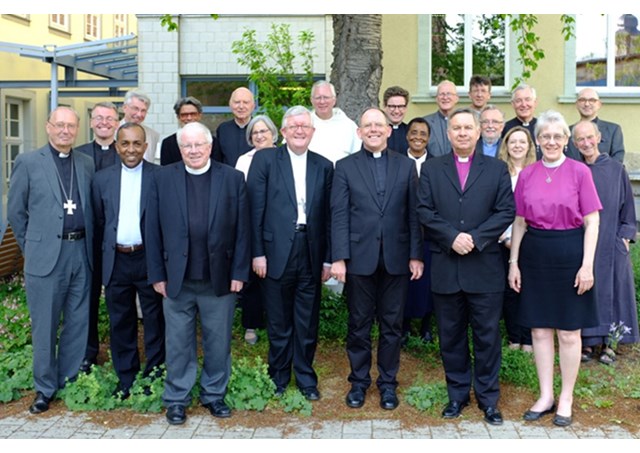Meeting in Erfurt, Germany, the Anglican-Roman Catholic International Commission reached a conclusion of the first part of their work on finding agreement on ecclesiology, or the structure of the church; focusing on ways that the two Churches are structured at local, regional and universal levels. This is meant to be the foundation on which the next step, on how the churches, at all levels, can discern right ethical teaching.
Despite what have been characterized as “difficult conversations” and “hard questions,” The Commission was particularly glad to complete its first agreed statement, and the first ARCIC statement since 2005. It hopes that Walking Together on the Way: Learning to be Church – Local, Regional, Universal will also be known as “The Erfurt Document”. The published text is expected to be available in 2018.
The Commission had decided to meet in Erfurt to mark the 500th anniversary of the Reformation. Erfurt is a significant city in the life of Martin Luther. It was here that he studied, decided to enter the Augustinian order, made his vows and was ordained.
The entire statement can be downloaded here (pdf)
From the Anglican Communion New Service
This first formal statement to be agreed in the third phase of the Arcic discussions addresses the structures and decision making processes of the two churches; and explores church order and the maintenance of communion. It paves the way for the work on Arcic’s next statement, which explores how the church discerns “right ethical teaching” at both a local and universal level.
The statement agreed this week asks the Churches to consider where they are in need of reform; and then to ask what they can learn from their ecumenical partner.”
Vatican Radio’s Philippa Hitchen spoke to the Catholic co-secretary of ARCIC III, Fr Anthony Currer of the Pontifical Council for Christian Unity.
Asking hard questions
Fr Tony says participants “asked hard questions of one another” and agreement was by no means “a foregone conclusion”, yet the encounter also produced some “very positive conversations”. By reflecting on what the Anglicans call ‘instruments of communion’ the group explored decision making at local, regional and universal level, within both traditions.
Receptive ecumenism
Using what’s called the ‘receptive ecumenism’ model, Fr Tony explains that “each of us on our pilgrim way, trying to walk in fidelity to the Lord,” is called to examine how we “are wounded in some way”. By speaking honestly to our dialogue partners about our difficulties and shortcomings, he says, “we can learn from one another”.
Synodal structures, open discussions
Asked about what Catholics can learn from their Anglican counterparts, Fr Tony points to the “processes of synodal life” including parish councils, diocesan administrations and other regional structures. Noting the way Pope Francis is calling for “a more synodal Church”, he says these are questions where “we can look to the Anglican Communion” whose structures are “a bit more developed than our own”. He also notes the “very frank and open culture of discussion about real difficult issues in the Anglican Communion”, saying “that’s something we could look to gain from”.
Reflecting on obstacles to unity, such as the ordination of women, Fr Tony says the new document looks at the broader questions of “ where authority lies,” adding that decisions taken at regional level are under “a lot of pressure to move in line” with the prevailing culture of the country.”
You can listen to the whole interview
Members present in Erfurt were:
Co-Chairs
Most Revd Bernard Longley, Archbishop of Birmingham, England
Most Revd Sir David Moxon, Archbishop of Canterbury’s Representative to the Holy See
Roman Catholics
Revd Robert Christian, OP St Albert Priory, Oakland, California, USA
Revd Canon Adelbert Denaux, Professor Em. Brugge, Belgium
Most Revd Arthur Kennedy Auxiliary Bishop of Boston, USA
Professor Paul D. Murray Durham University, England
Professor Sister Teresa Okure, SHCJ Catholic Institute of West Africa, Nigeria
Professor Janet E. Smith Sacred Heart Major Seminary, Detroit, Michigan, USA
Revd Professor Vimal Tirimanna, CSsR Alphonsianum University, Rome, Italy
Very Revd Dom Henry Wansbrough, OSB Ampleforth Abbey, England
Anglicans
Dr Paula Gooder The Church of England
Right Revd Dr Christopher Hill The Church of England
Right Reverend Linda Nicholls The Anglican Church of Canada
Revd Canon Dr Nicholas Sagovsky The Church of England
Revd Canon Dr Peter Sedgwick The Church in Wales
Revd Dr Charles Sherlock (Consultant) The Anglican Church of Australia
Revd Dr William Adam Representative of the Archbishop of Canterbury
WCC Observer
The Revd Dr Odair Pedroso Mateus Director of the Commission on Faith and Order

